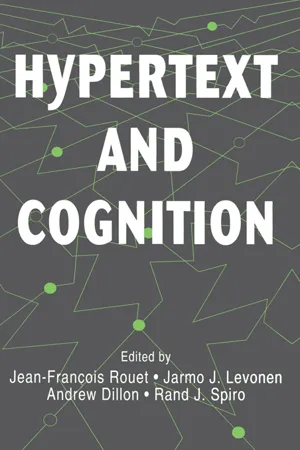
Hypertext and Cognition
- 192 pages
- English
- ePUB (mobile friendly)
- Available on iOS & Android
Hypertext and Cognition
About this book
The recent evolution of western societies has been characterized by an increasing emphasis on information and communication. As the amount of available information increases, however, the user -- worker, student, citizen -- faces a new problem: selecting and accessing relevant information. More than ever it is crucial to find efficient ways for users to interact with information systems in a way that prevents them from being overwhelmed or simply missing their targets. As a result, hypertext systems have been developed as a means of facilitating the interactions between readers and text. In hypertext, information is organized as a network in which nodes are text chunks (e.g., lists of items, paragraphs, pages) and links are relationships between the nodes (e.g., semantic associations, expansions, definitions, examples -- virtually any kind of relation that can be imagined between two text passages). Unfortunately, the many ways in which these hypertext interfaces can be designed has caused a complexity that extends far beyond the processing abilities of regular users. Therefore, it has become widely recognized that a more rational approach based on a thorough analysis of information users' needs, capacities, capabilities, and skills is needed. This volume seeks to meet that need.
From a user-centered perspective -- between systems and users -- this volume presents theoretical and empirical research on the cognitive processes involved in using hypertext. In so doing, it illustrates three main approaches to the design of hypertext systems:
*cognitive, which examines how users process multilayered hypertext structures;
*ergonomical, which explores how users interact with the design characteristics of hardware and software; and
*educational, which studies the learning objectives, frequency and duration of hypertext sessions, type of reading activity, and the user's learning characteristics.
This volume also tries to provide answers for the questions that have plagued hypertext research:
*What is hypertext good for?
*Who is hypertext good for?
*If it is useful for learning and instruction, then what type?
*What particular cognitive skills are needed to interact successfully with a hypertext system? Anyone interested in the fields of computer science, linguistics, psychology, education, and graphic design will find this volume intriguing, informative, and a definitive starting point for future research in the field of hypertext.
Tools to learn more effectively

Saving Books

Keyword Search

Annotating Text

Listen to it instead
Information
Table of contents
- Cover
- Halftitle
- Title
- Copyright
- Contents
- Contributors
- Preface
- La Maison Hypertext
- 1 An Introduction to Hypertext and Cognition
- 2 Studying and Learning With Hypertext: Empirical Studies and Their Implications
- 3 Myths, Misconceptions, and an Alternative Perspective on Information Usage and the Electronic Medium
- 4 Using Hypertext to Study and Reason About Historical Evidence
- 5 Effects of Overview Structure on Study Strategies and Text Representations for Instructional Hypertext
- 6 Comprehension, Coherence, and Strategies in Hypertext and Linear Text
- 7 Studying and Annotating Electronic Text
- 8 Notes on Hypertext, Cognition, and Language
- 9 Text and Hypertext
- Author Index
- Subject Index
Frequently asked questions
- Essential is ideal for learners and professionals who enjoy exploring a wide range of subjects. Access the Essential Library with 800,000+ trusted titles and best-sellers across business, personal growth, and the humanities. Includes unlimited reading time and Standard Read Aloud voice.
- Complete: Perfect for advanced learners and researchers needing full, unrestricted access. Unlock 1.4M+ books across hundreds of subjects, including academic and specialized titles. The Complete Plan also includes advanced features like Premium Read Aloud and Research Assistant.
Please note we cannot support devices running on iOS 13 and Android 7 or earlier. Learn more about using the app